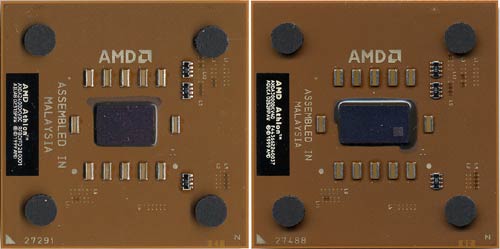AMD's Athlon XP 3000+: Barton cuts it close
by Anand Lal Shimpi on February 10, 2003 2:24 AM EST- Posted in
- CPUs
What's a Barton?
With AMD's 0.13-micron transition finally going as planned and 90nm still a 2004 item, it is no surprise that Barton is another 0.13-micron core. Replacing the short-lived Thoroughbred, Barton adds one major feature to the Athlon XP's list - a 512KB L2 cache. Other than a larger cache (and a respectively larger die), Barton is no different from Thoroughbred.

Thoroughbred (left) vs. Barton (right)
The larger L2 cache obviously improves performance a bit (we will explain exactly how and why later), and with that, AMD has given the Barton cores a slightly modified model rating system.
The Barton cores are going to be made available in three clock speeds, all using the new 333MHz FSB. The speeds and model ratings are summarized by the table below:
|
AMD
Athlon XP Model Numbers
|
|||
| CPU Name |
Clock
Speed
|
||
| Athlon XP 3000+ (Barton) |
2.167GHz
|
||
| Athlon XP 2800+ (Barton) |
2.083GHz
|
||
| Athlon XP 2800+ (333MHz FSB) |
2.25GHz
|
||
| Athlon XP 2700+ (333MHz FSB) |
2.167GHz
|
||
| Athlon XP 2600+ (333MHz FSB) |
2.083GHz
|
||
| Athlon XP 2600+ |
2.13GHz
|
||
| Athlon XP 2500+ (Barton) |
1.83GHz
|
||
| Athlon XP 2400+ |
2.00GHz
|
||
| Athlon XP 2200+ |
1.80GHz
|
||
| Athlon XP 2100+ |
1.73GHz
|
||
| Athlon XP 2000+ |
1.67GHz
|
||
| Athlon XP 1900+ |
1.60GHz
|
||
| Athlon XP 1800+ |
1.53GHz
|
||
| Athlon XP 1700+ |
1.47GHz
|
||
| Athlon XP 1600+ |
1.40GHz
|
||
| Athlon XP 1500+ |
1.33GHz
|
||
As you can see, the new Athlon XP 3000+ actually carries a lower clock speed than the previous flagship 2800+ (2.167GHz vs. 2.25GHz). The idea behind this is that the larger L2 cache makes up for the negative difference in clock speed, but as you'll see, this isn't always the case.

The Barton 3000+ and 2800+ will be available immediately, with the higher volume 2500+ coming at the end of February.










1 Comments
View All Comments
Anonymous User - Tuesday, October 21, 2003 - link
Curious? Athlon XP 3000+ (2.167GHz) Barton is running with Intel's P4 2.5 and above and keep up? Intresting